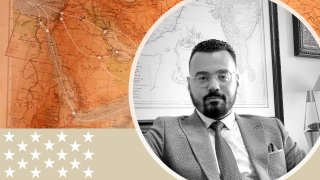The Man Whispering the Middle East’s Future into Washington’s Ear
Though rarely in the headlines, Mohammed Soliman is quietly reshaping U.S. strategy in the Middle East.
Events since 2021 have only served to validate Soliman’s theoretical framework further. The surest sign of implicit recognition was in early May 2023, when White House national security adviser Jake Sullivan laid out the Biden administration’s logic for supporting the I2U2 format. Echoing Soliman, Sullivan said the effort’s “fundamental notion is to connect South Asia to the Middle East to the United States in ways that advance our economic technology and diplomacy.” Other initiatives, such as India’s participation in the Greece-Cyprus-Israel trilateral and unveiling of the India-Middle East-Europe Corridor (IMEC), are further signs that Soliman’s framework is catching on at the highest levels of U.S. and regional foreign policymaking. “His work,” Nikolas Gvosdev elucidates, “is now vital to understanding how the international system is changing and how the two main centers of gravity—the Euro-Atlantic and the Indo-Pacific—are linked through the keystone interconnector of the Indo-Abrahamic corridor.”
I asked Soliman how much of a hand he had in the U.S. government’s recent initiatives, to which he only answered with a devilish grin.
We recently encountered each other at this year’s Raisina Dialogue, India’s flagship geopolitical and geoeconomics conference. The country plays an integral role in Soliman’s vision, and New Delhi’s foreign policy class appears particularly receptive to his concepts. Raja Mohan, who is also perhaps the leading commentator on India’s foreign policy, provided a ringing endorsement:
[Soliman’s] idea of a trans-regional system that extends the geographic scope of the Middle East is not only interesting but has also quickly turned out to be consequential. The emergence of I2U2 and IMEC to the east, the growing impact of the Gulf capital on Africa to the south, and the emergence of a geopolitical ‘Eastern Mediterranean’ to the west testify to Soliman's deep insights on the prospects for trans-regionalism. His ideas help us break out of the rigid political geographies that emerged after the Second World War.
Some of the proceedings at Raisina might as well have been scripted by Soliman himself. The event’s primary guest was Greek prime minister Kyriakos Mitsotakis, who demonstrated the Mediterranean country’s increasing interest in the Indo-Pacific. For Soliman, this is further evidence that his concept is gaining traction. He advocated for Greece’s inclusion into the Indo-Abrahamic Alliance in 2022:
Geopolitics is about moves and countermoves. As Pakistan and Turkey deepen their strategic partnership, the latter will increasingly emerge as a geopolitical rival to India rather than as a mere economic partner. This will provoke reactions. For example, Istanbul is attempting to pull the Maldives, located in the Indian Ocean, into its sphere of influence. Delhi’s response, as we’re seeing right now, is to strengthen its presence in the Mediterranean by seeking new partners. This dynamic of competition mixed with cooperation is only going to persist, further highlighting West Asia as a reality.
There remain problems, of course—significant ones even. The Abraham Accords, and with them, IMEC, are effectively “paused” owing to the ongoing Israel-Hamas War and Red Sea crisis. It’s almost fair to say that the fate of Soliman’s entire West Asia concept is now tied to how the question of Israel and Palestine is resolved. These events are concerning; no one will deny that,” says Soliman. “But one also has to adopt a broader perspective: the fact the region itself hasn’t disintegrated further and regional frameworks such as I2U2 and IMEC are still alive and well means that the West Asia concept is enduring despite the current situation.
Overall, Soliman appears to be rather confident. The economic and security interests of Europe, the Middle East, and India are aligned in his direction. The business incentives for a balance of power in the Middle East are strong, and companies all over seem to agree that the region is overdue for a period of stability amid the broader geopolitical, technological, and energy transition. U.S. foreign policy under both Joe Biden’s Democrats and the increasingly Trump-dominated GOP favor this geopolitical reorientation for multiple and sometimes differing reasons.
As Raisina winds down, I turn to Soliman and ask him what comes next; he seems to have the Magic Eight Ball. Who does he think will win the all-important U.S. presidential election, and how will that impact his efforts thus far? More broadly, what comes next now that it is increasingly evident that the age of Western-led international order is coming to an end?
Soliman smiles and reminds me that while he is a public intellectual, he is also, via McLarty Associates, a professional consultant. Not all advice or insight is publicly available. But he does leave me with this:
The fact that you and I, along with all of these intellectuals and international policymakers, are convening in Delhi, thousands of miles away from Brussels and Washington, underscores the reality of Asia’s unquestionable rise. At the same time, the reason we’re here is to advocate for new, transregional frameworks as a way to stabilize the current state of global disorder. We want to prevent further disintegration. Otherwise, Ukraine, Gaza, coups in the Sahel, and Taiwan are merely harbingers of what lies ahead.
Carlos Roa is an Associate Washington Fellow at the Institute for Peace and Diplomacy and a Visiting Fellow at the Danube Institute. He is the former executive editor of The National Interest and remains a contributing editor of that publication. Follow him on Twitter (X) at @CarlosRoa92.
Image: Chris Kobal / Middle East Institute.

